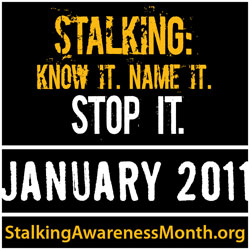
The National Stalking Awareness Month website provides educational material for the public and resources for stalking victims. The website notes that unlike other crimes, stalking is not a single, easily identifiable crime but a series of acts—a course of conduct directed at a specific person that would cause him or her fear. Often, stalking behaviors may be understandable only to the stalker and victim, and appear harmless to others not familiar with the situation, making it difficult to recognize, investigate and prosecute.
Stalkers fit no standard psychological profile. Many stalkers follow their victims from one jurisdiction to another, which presents an additional problem for the authorities to investigate and prosecute. Intimate partner stalking is the most common type of stalking and the most dangerous. Most victims don’t report being stalked. Stalking victims should log all stalking behaviors including emails, text and phone messages. They should also contact the National Center for Victims of Crime at 1-800-FYI-CALL for information, referrals, advocacy and assistance.
According to the Stalking Resource Center, most stalking cases involve some form of technology. Nowadays with the widespread use of social media websites, where one shares a lot of personal information, we should be careful with what we disclose to the public. So, here are a few tips I’d like to share with you that might help you avoid online stalkers:
If you use Facebook:
- Quit Facebook
- If you cannot quit Facebook for necessary family communication or similar needs, double check your account’s privacy settings.
- Create lists to group your Facebook friends, so that you can filter your updates to a specific group.
- Remove your phone information from your profile, Facebook’s mobile apps can add you to any of your friends phone contact list.
- Think about the information you post on the Internet.
If you use your mobile phone with Twitter or any picture sharing site like Plixi, Instagram or Flickr:
- Check your GPS settings. Some mobile twitter clients post your geolocation information with your tweets. Also, the camera software may be attaching the geolocation information to your pictures, so when posted online, it shows where the picture had been taken.
- Make your twitter timeline private, so only people you approve can read your tweets.
- Share your thoughts without sharing your activities.
- When posting a picture, double check all elements in the image so you don’t accidentally show something you consider private, like family members or a special location.
If you use any geolocation social media like Foursquare or Gowalla:
- Never check-in to places you consider private, like your home.
- Only check-in when you want to share with others your location.
- Don’t use the service frequently to publish where you are at all times.

